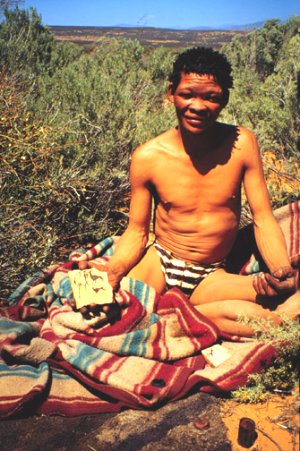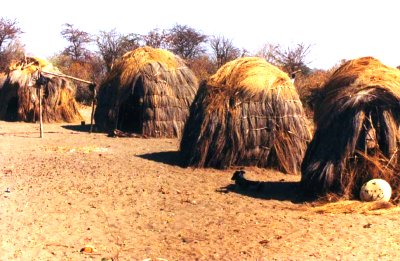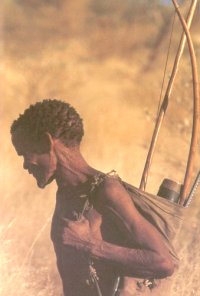Iziko Museums of Cape TownFor thousands of years before the arrival of European colonists, small groups of hunter-gatherers were spread over most of southern Africa. Their way of life enabled them to live successfully in even the driest and wettest areas of the subcontinent. The introduction of domesticated sheep,cattle and goats led to the emergence of nomadic herder groups some 2 000 years ago, mainly in the wetter coastal areas and the adjacent interior. In recent times these early inhabitants of the subcontinent have been called the 'Khoisan' people.
The herders, who generally referred to themselves as 'Khoekhoen' ( the term now preferred to 'Khoikhoi'), were later called 'Hottentots' by 17th-century European colonists, and the hunter-gatherers, called 'Sonqua', 'Obiqua' or 'San' by the Khoekhoen, came to be known as 'Bushmen'. These terms at first referred to differences in way of life, but began to take on racial meanings in the late 19th and 20th centuries. Nowadays the terms 'Bushmen' and 'Hottentot' are no longer used, and the preferred names are 'San' and 'Khoekhoen'. There were many different groups among the Khoisan people, however, each with its own name and language or dialect. Despite differences in language and way of life, Khoisan people shared common patterns of kinship, territorial organization, rituals and religious beliefs.
Between the 18th and early 20th centuries, the Khoisan population underwent major changes as a result of the European colonization of southern Africa, which led to the loss of control over the natural resources essential for an independent existence. Many Khoisan people were killed in warfare with European colonists and with other African people. A considerable number also died from introduced diseases, such as smallpox. The survivors were drawn into colonial society as domestic servants, farm labourers and industrial workers. In the western and north-western parts of southern Africa, some Khoekhoen people settled around mission stations, where they were able to maintain a semi-independent pastoral existence until as late as the 1950s. By then, however, in the central areas of the subcontinent there were only a few Kalahari San groups still dependent on hunting and gathering for a livelihood.
An extensive process of acculturation and Europeanisation has resulted in the incorporation of the descendants of Khoisan people into nearly all levels of society throughout southern Africa. Since the extensive political and social changes in South African and Namibian society began in the 1990s, some people of Khoisan origin have been vigorously asserting new forms of identity in an attempt to revive their cultural heritage.
http://www.museums.org.za/sam/resource/arch/khoisan.htm http://www.bushman-art.de/
http://www.bushman-art.de/ http://www.khoisan.org/
http://www.khoisan.org/ 
